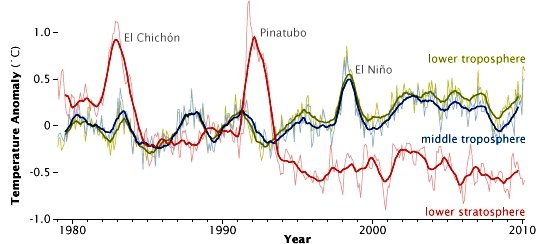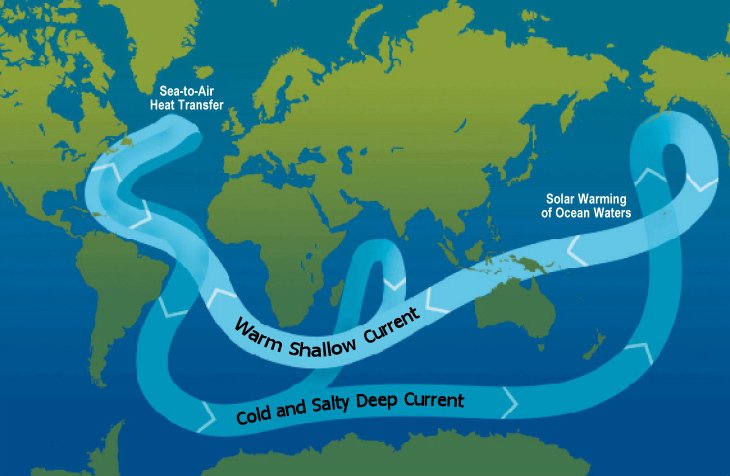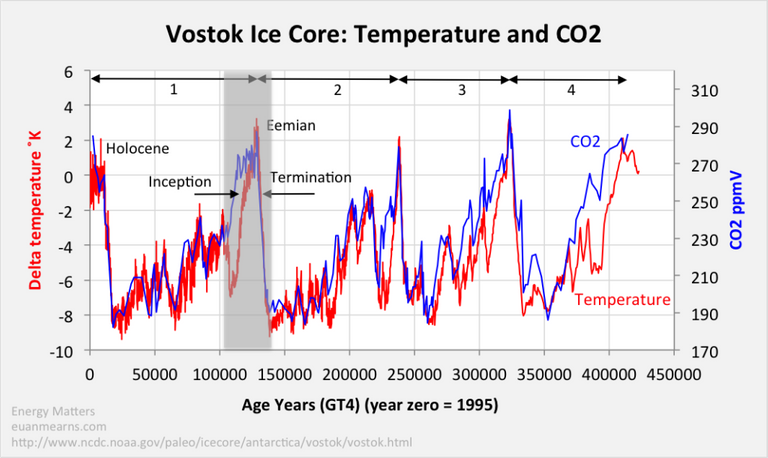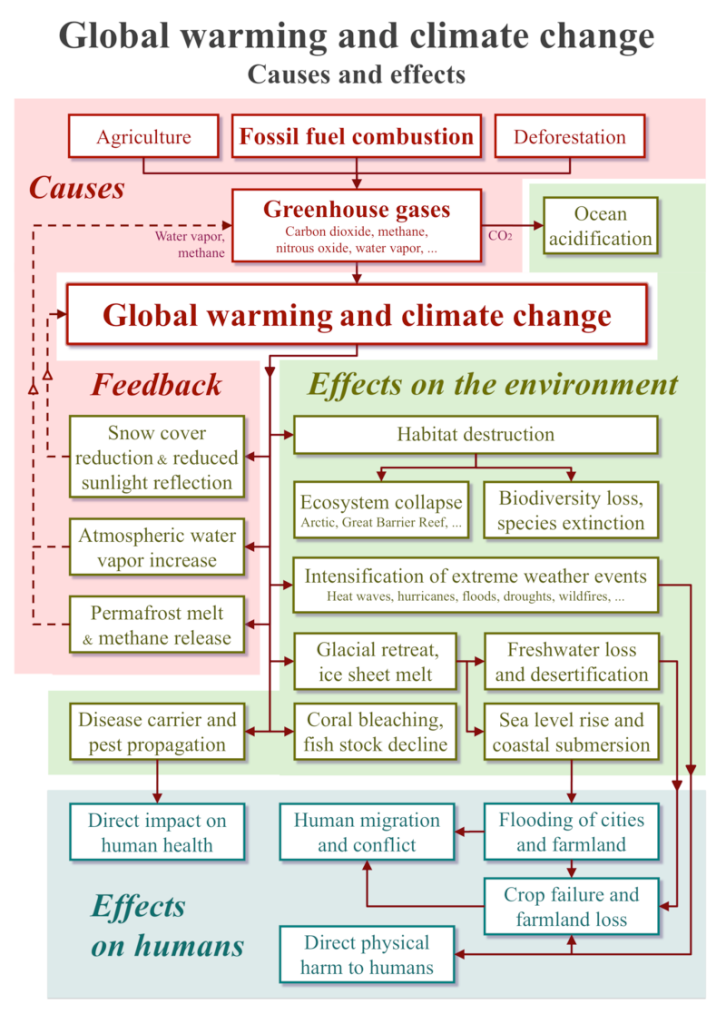Climate Change & IPCC reports: Digested information for practical use
For some strange reason that escapes me there are still climate change deniers out there. They claim 'Fake News' and point fingers at the scientists without looking at the science itself, which is and has for a long time been unequivocal. The confusing aspect is, if or not we really understand what we are dealing with, on a fundamental level. When it comes down to it, we actually don't know what's going to happen. We have no idea what chaos awaits when sea levels start to rise enough to flood major cities, causing mass migrations. Or when Deforestation and animal agriculture reaches a point where the imbalance of atmospheric chemicals causes ocean acidification, species extinction and extreme weather events. Yes, we are already starting to see such occurrences, but it is only the beginning, because the climate system is a very large machine which takes a long time to digest the actions of its inhabitants down below, leading to a delay in the reaction. This means that all we have emitted between 1900-2000 will probably only start to be felt to the full extent half a century or so later, long enough for the next generation of humans to be old enough to pick up the slack (something we're not too happy about). Thankfully since the last couple of months of global lockdown, there have been vast reductions of carbon emissions from the transport industry as everyone is staying home. However as the lockdown lifts, we are left with the decision to expediently resume the destructive patterns that have lead to negative environmental effects, or to meaningfully and consciously decide to operate within our means. I am very passionate about climate change as a blogger and always seek to learn more about the ways in which humans are innovating ways to be more sustainable. As the this is the first post on my account, I thought it would be a good idea to rehash some of my thoughts on the topic that i am most passionate about.
In any case, the sheer prospect of planetary deterioration is not a very happy thought, but regardless, the science is showing us the somber reality (I highly recommend seeing the documentary called Chasing Ice, If you haven't already seen it). Our greatest resource for scientific reports (that i know of) is the IPCC (International Panel on Climate Change). They have since their inception in 1988 produced 5 very long comprehensive reports, outlining the scientific data collated from the scientific community, as indeed "The IPCC does not conduct its own research. It identifies where there is agreement in the scientific community, where there are differences of opinion and where further research is needed". So from a very concrete, matter of fact point of view, there is nothing the climate deniers can dispute when it comes down to the facts. That's why science exists after all, to boil reality down to numbers and graphs so that we can better understand the representations of empirical data a.k.a the real world and what they mean for us.

The IPCC have simplified their reports by creating Summaries for policy makers (SPM) for the world leaders that continue to 'lead' us towards uncharted territory, and that rarely have the wherewithal to first try to understand planetary boundaries. There are also further mechanisms to simplify the understandings of the science with the likes of RFCs (Integrative Reasons for Concern) which provide a framework for summarising key impacts and risks across sectors and regions, and were introduced in the IPCC Third Assessment Report. RFCs illustrate the implications of global warming for people, economies and ecosystems. Impacts and/or risks for each RFC are based on assessments of the new literature that have appeared over the years. As in the 5th assessment report (AR5), this literature was used to make expert judgments to assess the levels of global warming at which levels of impact and/or risk are undetectable, moderate, high or very high, see below.

From the SR15 Summary for Policy Makers (SPM) report by the IPCC
The next AR6 synthesis report is expected to be finalized in the first half of 2022 in time for the first global stocktake under the Paris Agreement. The writing of AR6 SYR will be based on the content of the three Working Groups Assessment Reports: WG1 – The Physical Science Basis, WG2 – Impacts, Adaptation and Vulnerability, WG3 – Mitigation of Climate change, and the three Special Reports: Global Warming of 1.5°C, Climate Change and Land, The Ocean and Cryosphere in a Changing Climate. It might also take into account issues considered in other global assessment (such as Intergovernmental Platform for Biodiversity and Ecosystem Services and UN Environment’s Sixth Global Environment Outlook), if those issues are also addressed in the above-mentioned reports.
So, when it comes down to it, what is there to know about the current state of climate change? The simpler the better, so i will say this: everything on the planet is connected. It would be great if our emissions were released straight out into infinite space, but unfortunately there is this transparent bubble called the atmosphere that prevents that from happening. Fortunately It also protects us from dangerous cosmic rays. Therefore, when through our collective efforts to 'improve' our economic systems by boosting growth through capitalistic government incentives without a carbon tax, well, we get global warming. I see it more of a quid-pro-quo kind of thing, it's a bit like karma really, you reap what you sow. When you plant an apple seed into the ground, you will eventually get an apple tree, and the fruit will be apples. You may wish for a peach, but you will get an apple (Kung Fu Panda old turtle randomly came to mind). And so, we have planted an orchard of CO2 trees, and we will get global warming as the fruit, pretty simple really.
There are certain geological systems like the Ocean Conveyor belt and key weather events like El Niño and La Niña which play important roles in shifting and distributing energy around our planet, and when it comes to climate change they are the mechanisms by which our anthropogenic (human-caused) emissions are inputed into the system and transformed into global warming through the greenhouse effect. Yes, this has been the case for millenia and the planets climate does fluctuate naturally, however the issue today lies not only in the unnatural patterns of extreme weather events and extreme temperatures, but in the unparalleled rate of change which is fueled by the fossil fuel burning industries who relentlessly grow every year. The demand exists and as long as supplies last, people will not have the incentives needed to convert their habitual systems, that despite causing long term dangers (that could even threaten the very existence of our species) for short term systems that despite having the potential to thwart any long-term dangers, incur high short term costs. This is indeed, a problem. And although those that have the power to make a change seldom demonstrate the desire nor the understanding needed to convince the markets to ACT, we are becoming increasingly in need for such leaders to make themselves known. Because this is a time game, the clock is ticking, constantly and patiently, and despite our shortsighted and misled economic intentions, the geological systems which govern our planet and its climate and weather patterns does not wait patiently for us to change before it reacts, it simply reacts.
 By NASA, Robert Simmon -
By NASA, Robert Simmon -  , Public Domain, https://commons.wikimedia.org/w/index.php?curid=15358883
, Public Domain, https://commons.wikimedia.org/w/index.php?curid=15358883
 By Thomas Splettstoesser - US Global Change Research Program image, cropped and relabeled, Public Domain, https://commons.wikimedia.org/w/index.php?curid=3126655
By Thomas Splettstoesser - US Global Change Research Program image, cropped and relabeled, Public Domain, https://commons.wikimedia.org/w/index.php?curid=3126655
But more importantly, we should be referring to whether this has ever happened in the past. Fortunately there are such things as Ice cores and ocean sediment cores which represent the latest in scientific technology in collating climate change data (see graph below). In the case of ice cores (VOSTOK, EPICA or GIPS2), researchers are able to date air bubbles trapped in the Ice using a method called oxygen isotope analysis that is able to translate the air trapped in the ice into a record of earth surface temperature. In the case of the VOSTOK record, they drilled down from the top of the deepest ice sheet (around 3623 meters) to reach the 400,000+ year old ice. This is to date the most accurate method we have for records older than 12,000 years old (Paleoclimate records are from 12,000 to present). We are situated on the left side of the below graph, and whilst we should be dipping down into the next ice age right about now, as you would logically presume from observing the trend, humanity has appeared out of nowhere in the blink of a cosmic eye (industrial revolution since the last 100-200 years) and said 'NOPE', and we are instead heating the planet up, leading our previously pleasant voyage on our life ship called Earth into uncharted waters.

Essentially, it is the circular economy framework that is so positive a potential replacement system to the current linear and polluting economic system. This is because it manages to turn the feedback loops from working against us to working for us. This is a massive difference, as it is turning time in our favor, and who wants time as an enemy? By sowing less seeds of ecosystem destabilization and by 'closing the loop' on resource-intensive consumer goods through recycling and so on, there are no more loose variables that create uncertain outcomes. Or worse, certain negative outcomes.

By RCraig09 - Also, successive versions were developed through collaboration with users Efbrazil, Femkemilene, and J. Johnson on en.wikipedia., CC BY-SA 4.0, https://commons.wikimedia.org/w/index.php?curid=86068576
"Pour ce qui est de l’avenir, il ne s’agit pas de le prévoir, mais de le rendre possible."
– Antoine de Saint Exupéry, Citadelle, 1948
I found this quote on the IPCC website. It means: 'In regards to the future, it matters not how to predict it, but how to make it possible'. I thought this was a very inspirational quote by the author of 'The Little Prince', a thought provoking favorite author of many. For as much as we would like to remain certain of ourselves in our consumeristic ways of today, the future belongs to those who live today for tomorrow, making the conscious decisions to act according to the most sustainable solutions available today. This means reducing animal consumption to a minimum (not only for ethical concerns but also heavy resource consumption and deforestation, but this is a topic for another post), participating towards circular economy pathways through recycling programmes, lobbying your government for carbon tax, and being aware of the environment and the message it has for us: the planet is here to stay, and if we want to tag along, we need to adapt to it's boundaries, not take endlessly or push recklessly past the tipping points we know exist. True sustainability lies in the willingness to adapt to the needs of the many, not the few. Thanks for reading.
Peace, dizzybee
Congratulations @dizzybee! You have completed the following achievement on the Hive blockchain and have been rewarded with new badge(s) :
You can view your badges on your board And compare to others on the Ranking
If you no longer want to receive notifications, reply to this comment with the word
STOPTo support your work, I also upvoted your post!
Do not miss the last post from @hivebuzz:
Support the HiveBuzz project. Vote for our proposal!
"In regards to the future, it matters not how to predict it, but how to make it possible". Yes, I too, love this quote.
I'm really pleased to see oyu here @dizzybee. You're going to be great on Hive, despite the wobbly beginning. Always feel free to DM me if you need advice or support.
"True sustainability lies in the willingness to adapt to the needs of the many, not the few." I'd love to see some more posts spinning out from this thought. What do we need to DO to adapt to the needs of the many? And in what order? And how to promote-support-encourage-inform?
I've always found the Little Prince to be awesome in it's abstract nature, he really has a way with inspiring presence! And thanks for the warm welcome :D I'll definitely write this quote down on my list of ideas for future posts, I feel there is still more to say on the topic for sure.
Interesting thoughts about what paths are actionable now both on individual levels and the order in which actions should be taken. This is a very important point! More on the topic coming soon :))
Welcome to Hive!
@mack-bot curation has moved to @macks.buzz
Thank you <3
This post was shared in the Curation Collective Discord community for curators, and upvoted and reblogged by the @c-squared community account after manual review.
@c-squared runs a community witness. Please consider using one of your witness votes on us here